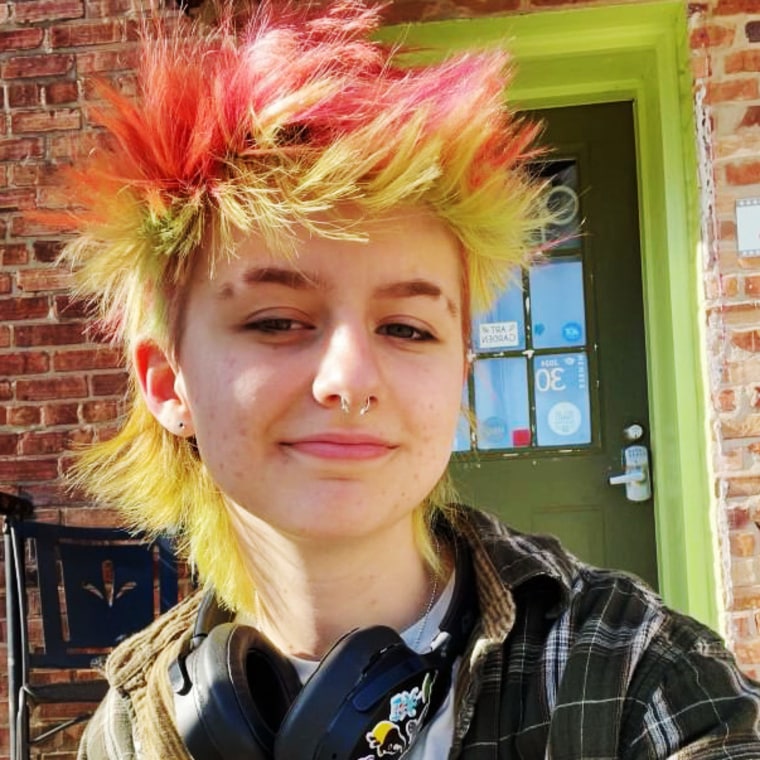LGBTQ students reflect on first school year under North Carolina’s ‘Don’t Say Gay’ law
Last August, shortly before Milo, 16, started his high school junior year, North Carolina enacted a law that would restrict how gender identity and sexual orientation are taught and addressed in public schools.
For the transgender teen, that meant that in this past school year, his Latin teacher no longer asked students for their preferred names and pronouns.
“It would have been more dangerous to do that than to not,” said Milo, who asked that his last name not be published because of safety concerns.

Conservative lawmakers who pushed for the law — the first section of which is titled the “Parents Bill of Rights” — argued that it is necessary to bolster parental control over the education and mental health of their children. Critics have compared the measure to Florida’s so-called “Don’t Say Gay” law, contending that it unfairly targets the LGBTQ community and, specifically, queer kids.A provision in the North Carolina legislation, Senate Bill 49, goes further than the Florida law, requiring educators to notify parents when students ask to be referred to by different names or pronouns. Some opponents to the measure have argued that the provision forces educators to effectively “out” gay and trans children to their parents.
Now, at the end of a full school year with the law in place, some LGBTQ students, parents and activists in the state say SB 49 has prevented teachers from offering queer kids support, prompted further bullying and created a hostile learning environment.
When asked for comment, Blair Rhoades, a spokesperson for the North Carolina Department of Public Instruction, referred NBC News to the law’s sponsors. She also noted that the legislation advises educators against alerting parents about a student’s desire to change their pronouns or name if “a reasonably prudent believe that disclosure would result in the child becoming an abused juvenile or neglected juvenile.”
Recommended

IMMIGRATIONLGBTQ migrants face ‘triple vulnerability’ as a group in Mexico aims to help them

OUT POP CULTUREQueer comedians take center stage in Netflix documentary ‘Outstanding’
The group of state senators who sponsored the law — state Sens. Lisa Barnes, Michael Lee and Amy Galey — did not return requests for comment.
“Teaching about gender identity, sexual activity, or sexuality has no place in the K-4 curriculum,” Galey said at a news conference before the state’s education committee voted on the bill in February. “Teachers must not determine when it is appropriate to discuss these topics with our youngest, most impressionable children.”
Noah, 13, a transgender middle schooler in Asheville, who asked that his last name not be published because of safety concerns, wanted to try going by he/him pronouns and a new name two years ago. He said that although he believed his parents would support him, he wanted to transition at school first because he “just wanted to see if it worked for me.”

“I actually told my teacher ‘Can you use my deadname, and she/her pronouns in front of my parents, just until I’m ready,’” Noah recalled, referring to his name prior to transitioning. “And looking back on that, if that law had been in place, like I probably would have gotten outed.”Milo and Noah, who say they have supportive parents, are worried about LGBTQ students in the state who don’t.
“I have multiple friends who, if their parents found out that they were trans in any way, whether it was like forcibly outing them or if they came out to their parents, they would probably get kicked out of their house,” Milo said, adding that in those cases schools previously would have been one of the few safe spaces available to them.
The teenagers and another LGBTQ student who spoke with NBC News said they were shocked to see their state lawmakers follow in the footsteps of Florida, which enacted its version of the law in 2022.
“My first thought was like ‘That’s horrible. I’m glad that’s not happening here,’’’ Isaac, 17, who also goes to high school in Asheville and asked that his last name not be published because of safety concerns. “I just thought it was too outlandish to ever make it. It felt so crazy.”

Now that the law is in place in his own state, Isaac is concerned about the trickle-down effect. “Kids can be cruel. Teenagers love to use ‘gay’ as an insult and everything,” Isaac said. “And I think legislation like this is like, the state is in on it, too. Now, this opens the door for queer students to be looked down upon.”
Craig White, the supportive schools director for the Campaign for Southern Equality, a North Carolina-based LGBTQ advocacy group, said he believed the influx of measures in states across the country was part of a wider strategy among conservatives.
He contrasted the introduction of the education bills with the implementation of the state’s trans “bathroom bill,” HB 2, in 2016. The law — which, at the time, was an outlier — caused a national uproar, with famous musicians, corporations and elite sporting associations boycotting the state. It was repealed in 2017.
“What the right learned from that is, you don’t roll out these laws in one state at a time,” White said. “And that’s why we’re seeing these laws happen in a dozen states, or 20 states, at once because half the country can’t be boycotted.”
Despite the lack of a national backlash against SB 49, White suggested that the law and others like it have spurred pushback at the local level.
“People are really fighting hard to keep culture wars out of their kids’ classrooms and we’re seeing parents get a lot more politically engaged,” he said.
The Campaign for Southern Equality filed a federal complaint against North Carolina in January, arguing that public schools are “systematically marginalizing lesbian, gay, bisexual, transgender and queer students in violation of Title IX.” The case is currently under review, according to White. Isaac was one of dozens of students, parents and educators who gave testimony in the 113-page complaint.
Despite their frustration with the changes within the last school year, the three teens who spoke with NBC News said the legislation has made them and other LGBTQ students more engaged in their communities and in local politics.
“It’s really hard at times and it feels like there’s a lot of people who really would just rather you not exist, rather you just not be there,” Milo said. “And like the biggest middle finger you can give them is just to keep being there, to keep existing.”